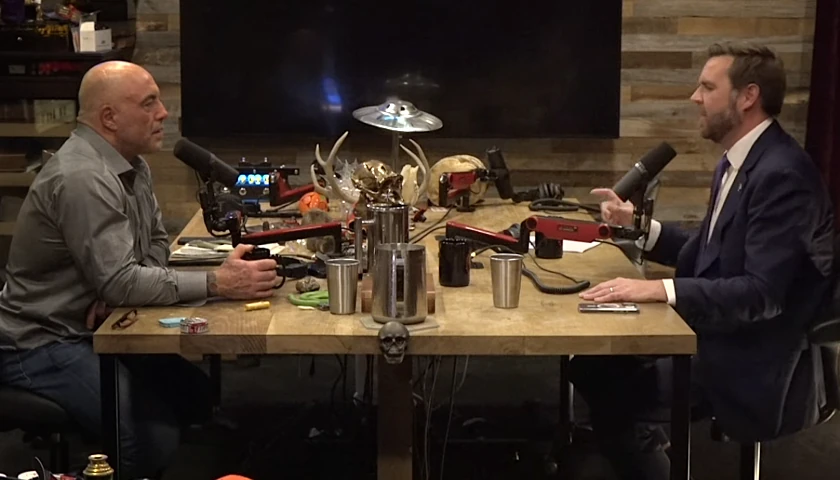The National Archives and Records Administration (NARA) placed warning labels on the Constitution, Declaration of Independence, and other historical documents, warning viewers that “some of the materials presented here may reflect outdated, biased, offensive, and possibly violent views and opinions.” The Arizona Sun Times requested comment from Arizona’s Democratic Senators Mark Kelly and Kyrsten Sinema, asking if they approved of the decision, and only received auto replies.
The warning about “harmful language” can be clearly seen at the top of the National Archives site. The new FAQ about the warning says harmful or difficult content includes “racist, sexist, ableist, misogynistic/misogynoir, and xenophobic opinions and attitudes” and material that is “discriminatory towards or exclude diverse views on sexuality, gender, religion, and more.” It says it includes “language that was accepted at the time.”
The FAQ reassures viewers that archivists are not only “informing users about the presence and origin of harmful content,” but “evaluating existing processes for exclusionary practices or institutional bias that prioritize one culture and/or group over another” and “making an institutional commitment to diversity, equity, inclusion, and accessibility.” The FAQ explains, “In the past, the National Archives has not had standards or policies to help archivists avoid harmful language.”
NARA tweeted on September 7 that the “alert is not connected to any specific records.” However, the warning appears on founding documents but not on documents from later years that contain multiple offensive words for blacks and Jews. Additionally, actions taken previously by NARA staff indicate they may be aimed at the founding documents. During the Archives’ Task Force on Racism on May 11, a museum subgroup recommended that NARA “retire” the term “charters of freedom” as descriptors for the U.S. Constitution, Bill of Rights, and Declaration of Independence. The subgroup also criticized the Rotunda, saying it should be “reimagined” since it doesn’t “tell the whole story” of slavery. Furthermore, the subgroup suggested adding new displays that “grapple with the contradictions between the founding ideals and the realities of slavery and Indian removal.”
The racism task force was created in response to the George Floyd race riots. It issued a 100-page report on April 20, which criticizes “legacy descriptions that use racial slurs and harmful language to describe BIPOC (black, indigenous, and people of color) communities.” Words like “illegal alien” and “crippled” should be removed and never used again. Archivists are instructed to “rewrite or discard” some of the online material at ourdocuments.gov and docsteach.org. Ourdocuments.gov “often uses adulatory and excessive language to document the historical contributions of White, wealthy men.”
Congress established NARA in 1934 in order to preserve the nation’s most important documents, including 1 to 3 percent that are so important for legal or historical reasons that they are kept forever.
Unlike Kelly and Sinema, some prominent political leaders spoke up and denounced the disclaimer. Rep. Lauren Boebert (R-CO-03) speculated in a tweet that it was an effort to get rid of the Constitution.
The National Archives have now put a disclaimer on their website that our historical documents may include Harmful Content.
They even slapped this warning on the Constitution.
We tried to tell you the Left wanted to get rid of it! pic.twitter.com/UeJtqgudMm
— Lauren Boebert (@laurenboebert) September 7, 2021
Former Virginia Attorney General Ken Cucinelli tweeted, “What are we becoming?” He asked, “Are you kidding me?”
What are we becoming? Now the National Archives posts a "Harmful Language Alert" on its website when you pull up the U.S. Constitution?!
Are you kidding me?#Constitution pic.twitter.com/GOLukUBUts
— Ken Cuccinelli (@KenCuccinelli) September 6, 2021
Mike Gonzalez, a former official in the George W. Bush administration and a Heritage Foundation fellow, tweeted that it was “nonsense.”
The National Archives has added a trigger warning to the Declaration of Independence. Have you had enough of this nonsense yet, America? pic.twitter.com/pUPFlHAF6B
— Mike Gonzalez (@Gundisalvus) September 7, 2021
Former Trump spokesman Tim Murtaugh said he thought it was a joke or a hoax when he first heard about it.
I thought this had to be a joke or a hoax when I first heard about it.
But, no, it’s true.
The National Archives has slapped a “Harmful Language Alert” on the U.S. Constitution.
Astounding.
See for yourself: https://t.co/EPTEBYTqB0 pic.twitter.com/M4QC3PMaq6
— Tim Murtaugh (@TimMurtaugh) September 9, 2021
– – –
Rachel Alexander is a reporter at The Arizona Sun Times and The Star News Network. Follow Rachel on Twitter. Email tips to [email protected].
Photo “Kyrsten Sinema” by Kyrsten Sinema.








